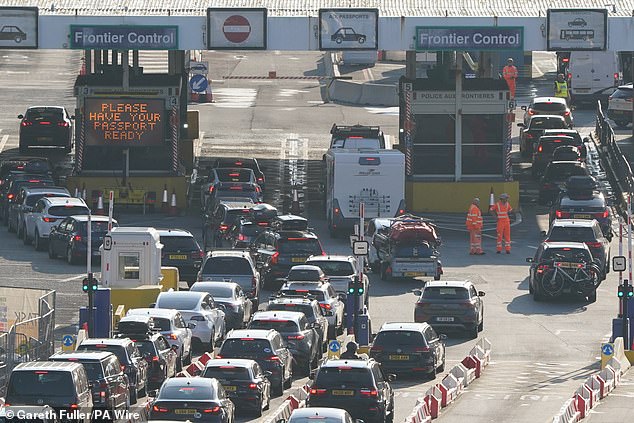EU fingerprint checks on British tourists entering Europe will lead to travel chaos, fears the government, which is begging Brussels to relax the rules
The government has asked Brussels to relax rules on fingerprint checks at the border amid fears it will cause travel chaos for British tourists entering Europe next summer.
Britons travelling to the EU from 17 November will have their fingerprints scanned and photos photographed, and will also have to show their passports when they first enter Europe.
However, the British government is concerned that the new border system could cause chaos on the roads in Dover as thousands of holidaymakers would have to undergo biometric checks before crossing the Channel.
Dover is being told to expect delays of up to 14 hours, with Kent County Council warning that the congestion could be ‘far worse’ than the 23 miles of traffic expected in 2022.
Immigration Minister Seema Malhotra said in a statement to the House of Commons that the government is lobbying the European Commission for extended emergency measures to allow French border guards to let travellers through more quickly during peak times.
Britons travelling to the EU from 17 November will have their fingerprints scanned, a photo taken and be required to show their passport when they first enter Europe. Pictured: Cars queue at the Port of Dover in Kent
The plans would mean border guards would no longer have to take fingerprints or photographs if there are “excessively” long queues at the port of Dover.
However, the measures will only apply for the first six months after the new system is introduced. Britain is advocating for them to remain in place after the summer holidays, when queues are at their longest.
“We believe that extending these deadlines to more than six months would improve the flow at the EU external border should queues occur during peak periods in early 2025 due to the additional processing time required for EES,” Malhotra said.
There are also fears that disruption from the launch of the Entry Exit System (EES) will be even longer, as an app allowing holidaymakers to register their details before they travel will not be ready until later in 2025.
The European Review Committee has heard that the app to reduce waiting times at locations with ‘juxtaposed controls’, such as Dover, Eurotunnel or Eurostar at St Pancras station, is facing delays due to the complexity of coordination between member states.
Malhotra added that EES would extend processing times at border crossings where British travellers enter the Schengen area.
“There has been insufficient progress to ensure that these impacts (and other potential impacts) are minimised. There is likely to be disruption when the scheme is introduced,” she said.
‘This is particularly true for journeys via London St Pancras, the Eurotunnel at Folkestone and the Port of Dover.’

Dover is facing delays of up to 14 hours, with Kent County Council warning that traffic jams could be ‘far worse’ than the 23-mile (37-kilometre) long tailbacks expected in 2022
On Monday, the Home Office also announced new legislation that will allow French border guards to operate within an extended border control zone at Dover, meaning holidaymakers will no longer have to wait in long queues for their biometric checks.
Currently, French border guards are only allowed to operate in eastern ports, but under new legislation they will also be allowed to operate in western ports, where special facilities will be in place to handle coach passengers.
The EES collects personal data, including first name, last name, date of birth, nationality, gender, travel document and the three-letter country code. Only children under 12 years of age are exempted.
It is an automated IT system that tracks travellers from non-EU countries entering and leaving the Member States of the European Union.
A firm launch date of November 17 has been set, after which there will be no extension. The date is expected to be formally confirmed at a meeting in Brussels next week.
Christian Wigand, European Commission spokesperson, said: ‘The roadmap for the delivery of the new IT architecture foresees that the Entry/Exit System will be ready for deployment in autumn 2024 and that ETIAS (European Travel Information and Authorisation System) will be ready for deployment in spring 2025.
‘The exact date will be determined by the European Commission and announced on the official EES website well in advance of the start of the work. At this moment we do not have a date to communicate’.
A Home Office spokesman said: ‘The EU will introduce a new entry/exit system in the autumn and the new government is currently reviewing the preparations made so far.’
